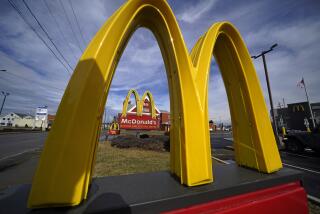Safeway Earnings Fall 73% on Strike
- Share via
Citing the grocery strike in Central and Southern California, Vons and Pavilions owner Safeway Inc. said Tuesday that its fiscal first-quarter profit plunged 73% from a year earlier.
The results were worse than analysts expected and added to the pressure on Chairman and Chief Executive Steven Burd, who is under fire from several public pension funds.
In the quarter, which ended March 27, the labor dispute wiped out $122 million, or 27 cents a share, of the company’s profit. And its troubles extended beyond California: Excluding stores involved in the dispute, sales at those open at least a year -- a key financial measure -- fell 1.3%.
Burd maintained that customer traffic at Vons and Pavilions was “sequentially improving week after week” as they rebuilt business in the aftermath of the 4 1/2-month-long strike. It ended Feb. 29 when a new three-year contract was ratified by members of the United Food and Commercial Workers union.
What’s more, Burd didn’t cut Safeway’s per-share earnings guidance for the full fiscal year, as some investors had feared. It remains in the $1.95 to $2.03 range, excluding the effect of the strike, that the company provided in December.
“We are tracking with those numbers,” he said.
Shares of Pleasanton, Calif.-based Safeway rose after the results were announced, gaining 72 cents to $23.50 on the New York Stock Exchange.
Beyond the effect of the labor dispute in the quarter, the closure of 12 stores at Safeway’s Dominick’s division in the Chicago area cut its profit by $29 million, or 6 cents a share.
The result: Overall net income fell to $43.1 million, or 10 cents a share, from $163 million, or 36 cents, in the same period last year. First-quarter sales fell 5% to $7.6 billion from $8 billion. Safeway operates 1,808 stores.
Excluding the Dominick’s closures, Safeway’s profit was 16 cents a share in the quarter. On that basis, analysts surveyed by Thomson One Analytics had expected the supermarket chain to earn 23 cents a share.
During a conference call with analysts, Burd declined to specify how quickly Vons and Pavilions were recovering from the strike, saying he didn’t want to tip his hand to competitors.
“We see sequential improvement as we move through the weeks, and it’s consistent with the pattern we’ve had with [other] strikes of similar duration,” Burd said. But he said the lingering effects of the California dispute would “in all likelihood” continue at least through this year’s third quarter.
In Central and Southern California, Safeway bargains jointly with Ralphs parent Kroger Co. and Albertsons Inc. After the UFCW struck Safeway Oct. 11, Ralphs and Albertsons locked out union workers. In all, 59,000 workers were idled at 852 stores.
The labor strife sent many consumers to other stores, giving competitors a big windfall. Whole Foods Market Inc. said Tuesday that its fiscal second-quarter profit jumped 38% in part because of higher sales at its 19 Southern California stores. Net income rose to $35.3 million, or 54 cents a share, from $25.6 million, or 41 cents, a year earlier. Sales in the period ended April 11 rose 24% to $902.1 million.
Safeway’s troubles have prompted public pension funds in California and several other states, which are major investors, to press for an overhaul of management and stepped-up board oversight. Safeway responded Monday by saying it would replace three directors to increase the number of independent directors on its board.
The California Public Employees’ Retirement System said Monday that the move wasn’t enough, and that Safeway’s problems required that Burd be removed as chairman and CEO.
The company’s stock has dropped from $60 a share three years ago.
More to Read
Inside the business of entertainment
The Wide Shot brings you news, analysis and insights on everything from streaming wars to production — and what it all means for the future.
You may occasionally receive promotional content from the Los Angeles Times.











